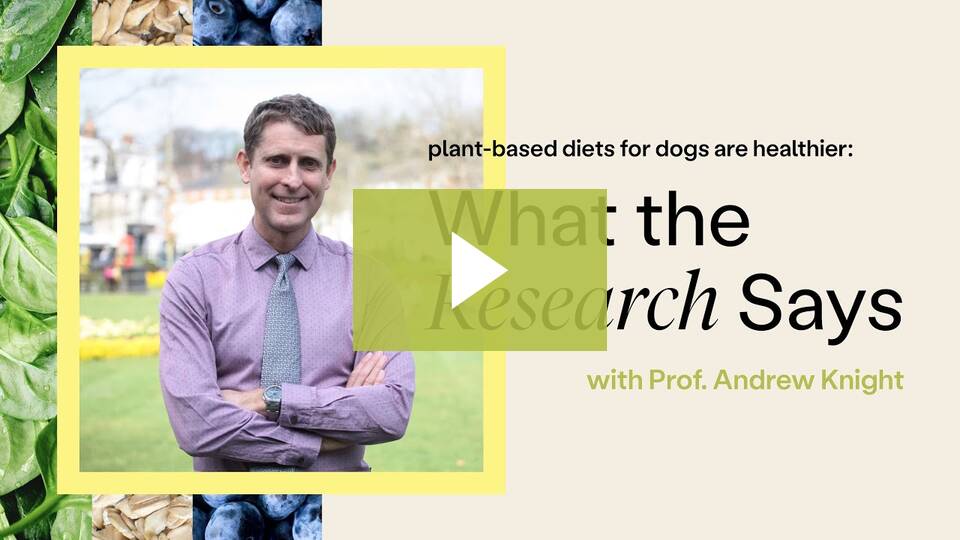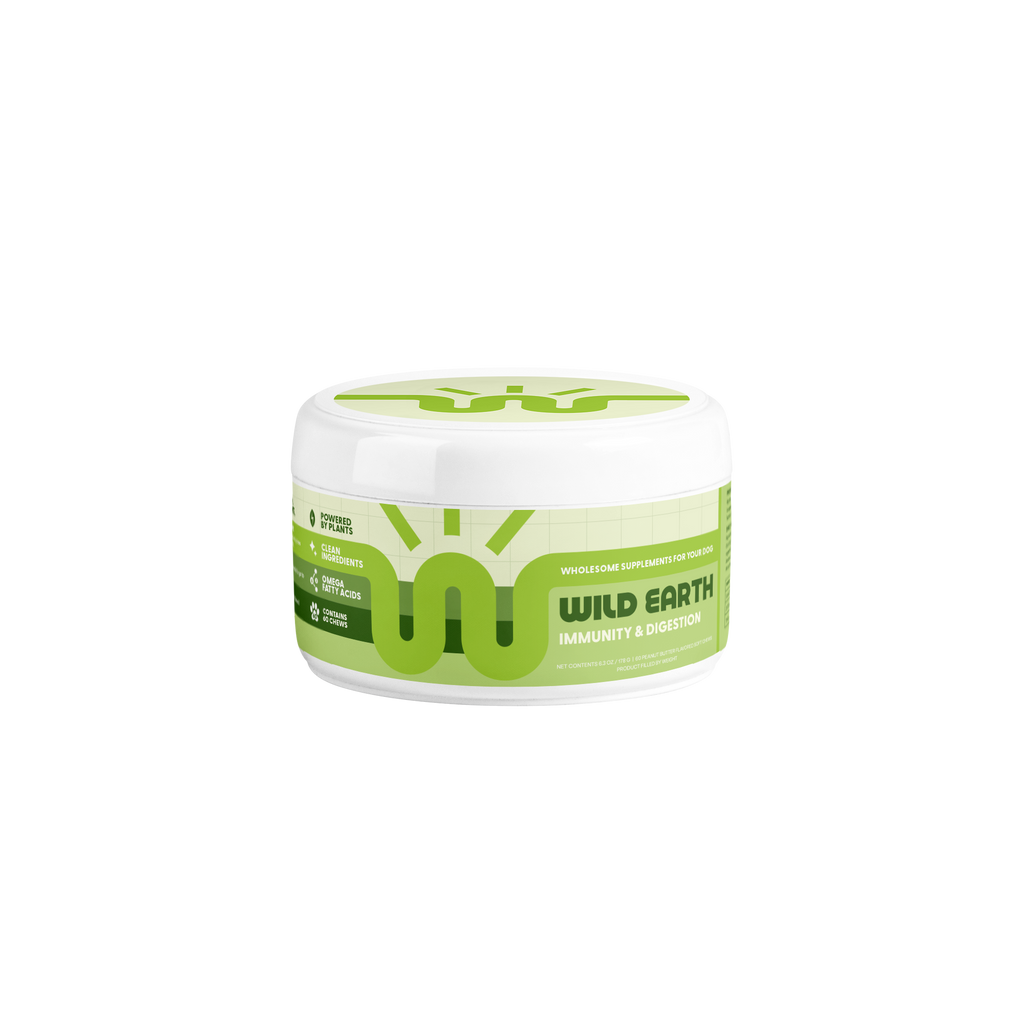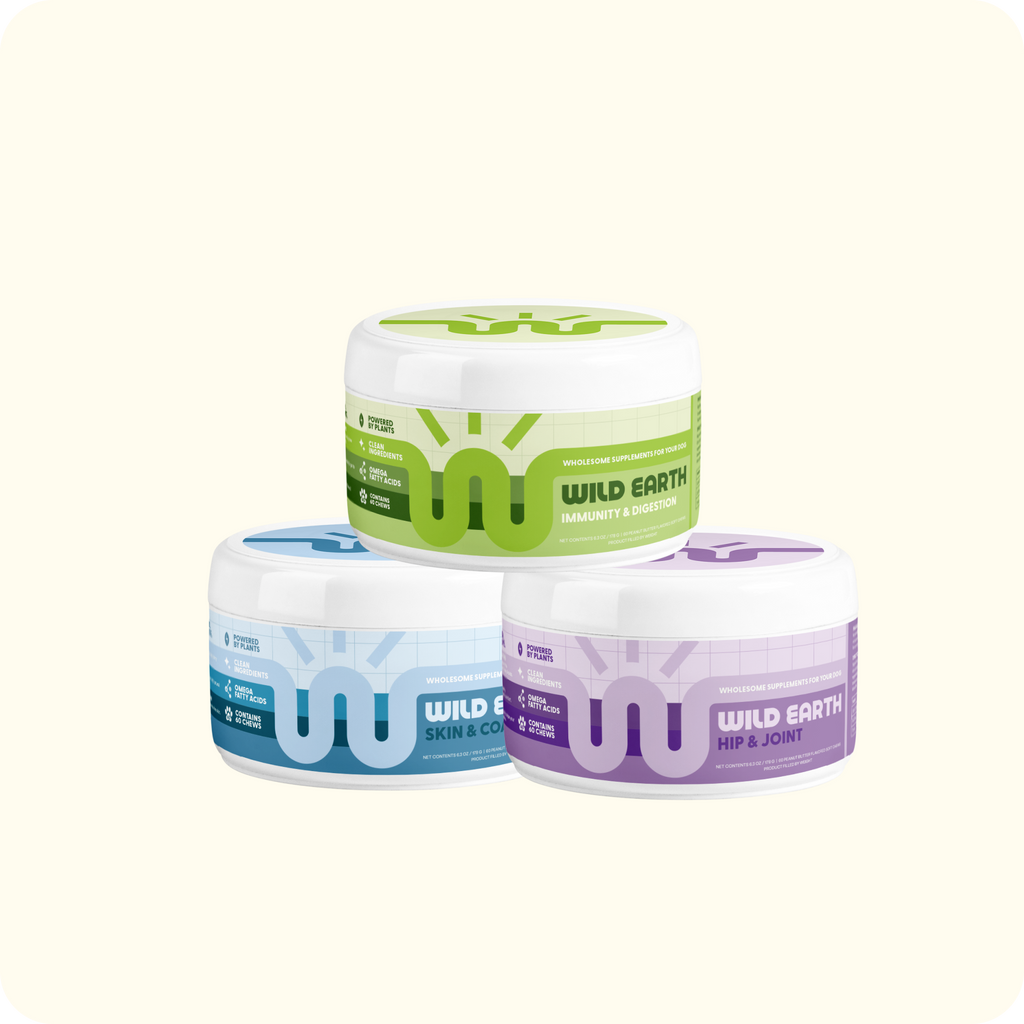
A Special Note From Tiffany Ruiz Dasilva, VMD, cVMA | Professional Services Veterinarian, Wild Earth
“Dogs have dietary requirements for energy and essential nutrients, but they do not have a recognized requirement for animal-derived ingredients per se” (Dodd, 2018).
As veterinarians, we are taught to think critically and to be open-minded, as science is ever-evolving. However, many of us will shut down when we hear the words “plant-based” when referring to dog food. We are rightfully very skeptical about alternative diets, including plant-based diets, because many past studies found that these were nutritionally deficient. The reason for this was that most people were formulating their own vegan diets, and these, of course, were not nutritionally complete and balanced.
In the last several years, however, there has been an explosion in evidence-based research that supports plant-based feeding in dogs. We now have many commercial companies that are manufacturing these foods on an industrial level, and most are taking good steps to ensure that products meet a high standard and are nutritionally complete and balanced. As veterinarians, we need to think critically and adjust our mentality based on the overwhelming weight of evidence on the side of nutritionally sound plant-based diets.
Not only are plant-based diets inherently free from the most common food allergens for dogs, making them a great option for food-allergic dogs, but recent evidence also suggests that dogs who eat a plant-based diet have improved health outcomes and increased longevity. Commercially available plant-based diets also provide clients wishing to feed plant-based a safe, nutritionally complete, and balanced option. All in all, plant-based dog food introduces an option for veterinarians and pet parents alike that can potentially help with symptoms caused by food allergies, improve overall health, support environmental sustainability, and improve animal welfare on a large scale.
Complete and balanced plant-based diets should be given equal consideration to meat-based diets, especially given the current understanding of pet nutrition, and the emphasis on nutrients, not ingredients. Currently, meat-based diets are evaluated based on whether they meet AAFCO requirements for nutritional sufficiency and plant-based diets should be evaluated using the same criteria.
Have Questions? Contact hello@wildearth.com

Simple Ingredients, Scientifically Crafted
Wild Earth: A Brand You Can Confidently Recommend
Ingredients with a Purpose If it’s in our food, it helps dogs thrive.
Wild Earth Dog Food
- Free of the top 5 most common dog food allergens
- Free of legumes
- Grain-inclusive
- Guaranteed levels of Omega-3 and -6 fatty acids
- Guaranteed levels of methionine and lysine**
- Nutrient profile based on chemical analysis of the finished product
Ingredients & Guaranteed Analysis - Dry Matter
Ingredients & Guaranteed Analysis - Dry Matter
Performance Formula Dog Food
This high-protein formula contains a variety of high-quality ingredients, as well as provides DHA and prebiotic fiber. Available in Veggie Chick’n Kabob Flavor.
Happiness Guarantee
Happiness Guarantee
We care deeply about customer and dog satisfaction and building a long-term relationship with you. Our Happiness Guarantee is just one way we ensure our customers love our products and are treated great by our company.
Try our food, treats, and supplements for 30 days, and if your dog doesn’t love them, we’ll issue you a full refund – no questions asked.

How Our Food Compares, Where it Matters Most
*All values are in dry matter. If ash content was not included in the guaranteed analysis then the estimation of 7% was used.

Tiffany Ruiz Dasilva, VMD, cVMA | Professional Services Veterinarian, Wild Earth
“Vets are rightfully skeptical about plant-based diets for dogs because historically people were creating unbalanced home-cooked diets, but that’s not the case anymore. Now there are commercially produced complete and balanced plant-based dog foods made with digestible and high-quality ingredients that are free from the most common dog food allergens, and they deserve consideration.” – Tiffany Ruiz Dasilva, VMD, cVMA
About Dr. Ruiz Dasilva
About Dr. Ruiz Dasilva
Dr. Tiffany Ruiz Dasilva is a creative, versatile, passionate, and enthusiastic veterinarian with expertise in canine nutrition. Her areas of interest include animal nutrition, behavior, pain management, and pet parent education, with the overarching goal of improving the human-animal bond. She received her Bachelor of Science degree in Biology with a focus on Brain and Behavior from Brown University and worked in wildlife conservation in Africa. She attended veterinary school at the University of Pennsylvania. Following graduation, Dr. Ruiz Dasilva worked in general practice and received her Fear Free certification. In 2020, in response to the lack of access to veterinary care during the pandemic, she created an affordable, multilingual telehealth platform in an effort to make veterinarians more easily accessible, and, in turn, provide pet parents with factual information to optimize their pet’s health. As accessibility to in-person care returned, she channeled her passion for improving the human-animal bond into pursuing a certification in acupuncture and began working at a rehabilitation practice. It was during this time, coupled with her previous experiences, that she continued to realize the immense importance of nutrition in chronic disease and overall health, leading her to pursue the position of veterinarian at Wild Earth, a plant-based pet food company. She has gained expertise in the field of nutrition through numerous certifications and coursework. She has worked tirelessly to compile the evidence for plant-based feeding in dogs, has spoken to leading experts in the field, and has come to see the benefits of a plant-based diet for longevity and symptom relief for many dogs. As part of her role at Wild Earth, Dr. Ruiz Dasilva advises on product formulation and feeding guidelines, presents at conferences, and helps to educate pet parents and veterinarians.
Contact: veterinarian@wildearth.com

Andrew Knight, BSc (Vet Biol), BVMS, CertAW, MANZCVS, DipECAWBM (AWSEL), DipACAW, PhD, FRCVS, PFHEA
“Vegan diets for dogs may be linked with better health, and could be less hazardous, than meat-based diets: Survey findings may support nutritionally complete vegan dog diets over raw or conventional meat diets.” – Professor Knight
About Professor Knight
About Professor Knight
Andrew Knight is Professor of Animal Welfare and Ethics, and Founding Director of the University of Winchester Centre for Animal Welfare, and Adjunct Professor in the School of Environment and Science at Griffith University, Queensland. An experienced cat and dog veterinarian, he’s also a European, American, New Zealand, and RCVS-recognised Veterinary Specialist in animal welfare and related fields. He has around 150 academic and 80 popular publications, and an extensive series of YouTube videos and several websites (including www.sustainablepetfood.info), on plant-based companion animal diets, climate change, and the livestock sector, invasive animal research, educational animal use, humane clinical and surgical skills training, and other animal welfare issues. He regularly works with animal welfare charities to advocate for animals and is frequently interviewed by the media. He has received over 20 awards and research grants for this work.

Jennifer Coates, DVM
“Pet parents may choose to feed their dogs a plant-based diet for many reasons including ethics, religion, health, and concerns about farm animal welfare and the environment. As long as a plant-based dog food is nutritionally complete and balanced, it will provide all the protein and other important nutrients dogs need to thrive.” – Dr. Coates
About Dr. Coates
About Dr. Coates
Dr. Jennifer Coates is an accomplished veterinarian and writer with years of experience in the fields of veterinary medicine, animal welfare, and conservation.
After graduating from McGill University, she worked at the Wildlife Habitat Enhancement Council and Animal Welfare Institute for several years before returning to her first love, veterinary medicine. She was valedictorian of her graduating class at the Virginia-Maryland Regional College of Veterinary Medicine. In the years after veterinary school, Dr. Coates has been an associate veterinarian and chief of staff in several veterinary practices in Virginia, Wyoming, and Colorado.
She has also published several books (including Dictionary of Veterinary Terms: Vet-Speak Deciphered for the Non-Veterinarian) and thousands of articles that all relate to veterinary medicine, pet care, and the human-animal bond.

Erika Sullivan, DVM
“Plant-based diets for dogs: a planet- healthy, hypoallergenic approach to feeding (wo)man’s best friend!” – Dr. Sullivan
About Dr. Sullivan
About Dr. Sullivan
Dr. Erika Sullivan is a veterinarian from Toronto. After spending eight years in small animal practice in Canada, she moved to Thailand where she then spent nine months working at an elephant and dog shelter. Dr. Erika then moved to Australia, where she has been working for the past eight years in small animal practice and emergency medicine with Australian native wildlife. She currently teaches veterinary nursing, and casually as a scuba diving instructor and shark conservation enthusiast. She is certified in Traditional Chinese Veterinary Medicine, Food Therapy, and Veterinary Acupuncture, which she practices to offer alternative modalities and a comprehensive integrative approach to her patients. Dr. Erika is passionate about traveling abroad and helping street animals in need. Four years ago she started an international volunteer project at an animal shelter in India called the Vadodara Centre for Animal Rescue and Emergency (VCARE). It is there where she merges her passion for teaching with a desire to help unwanted street dogs, cats, and livestock. She uses these experiences to teach students veterinary medical skills while educating them on the global threats to our planet.

Clare Knottenbelt, BVSc MSc DSAM MRCVS | Chief Veterinary Officer, Kromix Therapeutics
“We need to look at the nutritional impacts of meat. Red meat is considered a grade 2 carcinogen and processed meats are grade 1 due to the bioaccumulation of toxins.” – Dr. Knottenbelt
About Dr. Knottenbelt
About Dr. Knottenbelt
Dr. Clare Knottenbelt is a graduate of Bristol University and then completed her residency at the University of Edinburgh with a specialty in small animal medicine. She was the Clinical Director of the University of Glasgow’s Small Animal Hospital for 6 years and worked within the University’s Oncology service for 11 years. Through her work with Hawk and Dove, Clare provides support to help general practitioners deliver accessible cancer care to their patients. Throughout her illustrious career, with more than 20 years of experience, she has worked to provide accessible cancer care to pets around the world and continues to spread her love of animals providing support to horses with cancer as well as developing novel treatments for cancer in dogs.
Contact: clarek@hawkanddovevets.co.uk
Joining our Affiliate Program is Simple
Click the button below to review the contract terms and submit your application. This will create your account with our affiliate partner, Impact Radius (a third-party tool that will track all of the purchases and payouts). Once your application is accepted, you will be able to create tracking links and start promoting our products on your website or directly with your patients. Subscription orders will receive 75% commission and One-Time-Purchases will receive 30% commission.

How it Works: Get Started
Important tip: Tracking links, tracking QR codes, or custom promo codes are essential for our affiliate program as this allows us to track the results of your efforts.
Within your Impact Radius dashboard, you will be able to create tracking links to specific pages on our website. Typically our affiliate partners will either send their traffic to our homepage or directly to a product page.
Once the tracking link is created, share the link with your patients, via email/SMS list or on your website.
Contact support@wildearth.com with any questions about our affiliate program.


















































